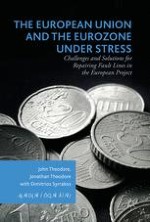2017 | OriginalPaper | Buchkapitel
3. The Eurozone Debt Crisis
verfasst von : John Theodore, Jonathan Theodore, Dimitrios Syrrakos
Erschienen in: The European Union and the Eurozone under Stress
Aktivieren Sie unsere intelligente Suche, um passende Fachinhalte oder Patente zu finden.
Wählen Sie Textabschnitte aus um mit Künstlicher Intelligenz passenden Patente zu finden. powered by
Markieren Sie Textabschnitte, um KI-gestützt weitere passende Inhalte zu finden. powered by
